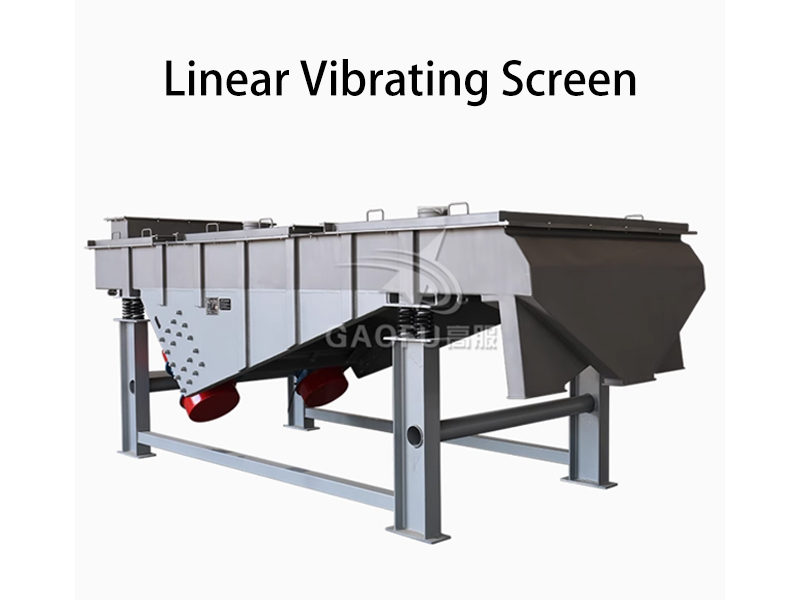In many industries, precise classification and grading of materials are essential for ensuring the production of high-quality products. One such process is the screening of aluminum foil sheets, which requires effective separation based on material size, quality, and consistency. The linear vibrating screen is a highly effective solution for this task, offering precise separation and consistent grading of aluminum foil sheets.

This article explores the advantages and features of using a linear vibrating screen for the screening and grading of aluminum foil sheets, focusing on how it enhances material classification and improves overall process efficiency.
What is a Linear Vibrating Screen?
A linear vibrating screen is a type of screening equipment designed to separate materials based on their size and properties. It uses a vibration motor to produce a linear motion that moves the material across the screen surface. The vibration helps the material pass through mesh screens with different sizes, sorting particles into various categories. This type of screening machine is ideal for materials that need to be classified or graded into specific sizes, such as aluminum foil sheets.
Unlike other types of vibrating screens, the linear vibrating screen produces a consistent, uniform vibration that allows for high-throughput processing. This is particularly useful for industries where efficiency, precision, and accuracy are essential, such as the aluminum foil production industry.
Importance of Aluminum Foil Sheet Classification
Aluminum foil sheets are used in a wide range of applications, including packaging, electronics, construction, and food processing. The need for precise material grading is crucial in ensuring that the sheets meet specific thickness and quality standards. Any inconsistency in the size or quality of the aluminum sheets can affect the production efficiency, product quality, and end-use applications.
By using a linear vibrating screen for aluminum foil sheet screening, manufacturers can achieve the following benefits:
- Uniform Sheet Thickness: Ensures that all aluminum foil sheets are consistent in thickness and can meet specific product requirements.
- Enhanced Production Efficiency: By accurately classifying the material, manufacturers can optimize downstream processes like cutting, packaging, and assembly.
- Improved Product Quality: Removes oversized or undersized sheets, ensuring that only the properly classified aluminum sheets are used for final products.
Key Advantages of Using a Linear Vibrating Screen for Aluminum Foil Sheet Screening
1. High Screening Efficiency
The linear vibrating screen operates with a high-frequency vibration that moves the material across the screen surface. This results in faster material processing and higher throughput. For aluminum foil sheets, this means more material can be screened in a shorter period, improving overall production efficiency.
The linear motion ensures that the material moves in a straight line, which allows the screen to separate larger and smaller aluminum sheets effectively. This helps achieve accurate grading and reduces the possibility of material clumping or jamming.
2. Precise Material Classification
One of the main goals of using a linear vibrating screen for aluminum foil sheets is to classify the material into different categories based on size. The screen allows for precise separation of aluminum sheets into different grades—for example, oversized sheets, undersized sheets, and those that meet the required specifications.
With different mesh sizes available, the linear vibrating screen allows manufacturers to fine-tune the separation process, achieving highly precise material grading. This is essential for ensuring that the aluminum foil sheets are ready for further processing or packaging, meeting the desired quality and specifications.
3. Minimal Maintenance and Easy Operation
The linear vibrating screen is designed to be easy to maintain and operate. The simple structure of the screen, coupled with its reliable operation, minimizes downtime and reduces maintenance costs. This is particularly beneficial for industries with high-volume production, where maintaining operational efficiency is crucial.
The wear-resistant materials used in the construction of the linear vibrating screen ensure that it can handle the abrasive nature of aluminum foil sheets without significant wear or damage. This results in a longer service life and fewer maintenance interruptions.
4. Versatility and Adaptability
The linear vibrating screen is highly adaptable and can be customized for different types of material screening. Whether you're dealing with large aluminum foil sheets or small aluminum flakes, the screen can be adjusted to meet specific needs, ensuring that the classification is efficient and precise.
This versatility makes it an ideal choice for industries that need to process a variety of materials or that require a flexible screening solution for different grades of aluminum foil.
5. Consistent and Reliable Performance
A key feature of the linear vibrating screen is its ability to provide consistent and reliable performance over long periods. This is achieved through the use of high-quality components, such as the vibration motor and screen mesh, which are designed to operate smoothly and efficiently.
For the aluminum foil industry, this means that manufacturers can rely on the screen to deliver consistent quality and accurate grading day in and day out, contributing to improved product quality and increased customer satisfaction.
